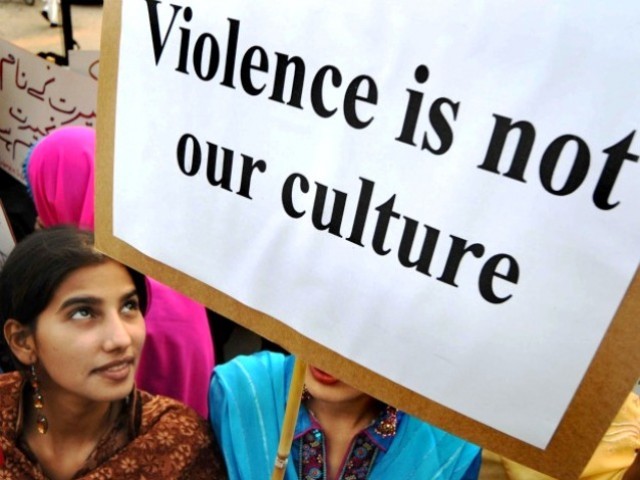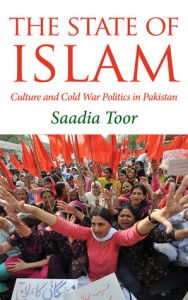Review | The State of Islam: Culture and Cold War Politics in Pakistan Books
Books, New in Ceasefire - Posted on Thursday, November 8, 2012 6:27 - 2 Comments
By Shozab Raza

Pakistani women march during a rally on violence against women in Lahore on November 29, 2010.(Photo: Arif Ali/AFP/Getty Images)
After the shooting of Malala Yousafzai by the Taliban and as demonstrations against an anti-Islamic film hit cities throughout Pakistan, once again mainstream media coverage left viewers and readers with the impression that the country is embroiled in a spate of irrationality, violence and Islamic fundamentalism. Juxtaposed to these images are the celebratory appraisals, far less prevalent but no less disturbing, of liberal Pakistanis as carriers of the torch of progress, challenging the supposed dominance of religious conservatism with their underground parties, mini-skirts and shots of hard liquor. These are the twin narratives of Pakistan typically screened to the world.
Within this context, Saadia Toor’s recent book The State of Islam offers a refreshing dose of nuance, discarding this polarized lens through which Pakistan is often registered. Tracing the history of Pakistan from its pre-partition imagination to its post-partition bouts of successive dictatorships and democracies, Toor foregrounds the role played by class politics, particularly the socialist Left, in the unfolding of this history.
The story begins with pre-partition politics. While we’re typically told that the Pakistan movement, notoriously initiated with the Lahore Resolution of 1940, was an enterprise of religious nationalism, Toor insists that Pakistan was imagined differently by different actors. Muhammad Ali Jinnah, Pakistan’s founding father in nationalist history, wanted a secular Pakistan whose raison d’être was to protect Muslims interests felt to be threatened in a Hindu-dominated India. But it was a particular class of Muslims that Jinnah and his Muslim League were concerned about. They were what social scientist Hamza Alavi termed ‘the salariat class’: the educated, secular-minded Muslim bureaucrats in the colonial government who felt that their aspirations for power would not be fulfilled in a Hindu-dominated post-colonial India.
On the other hand, the Indian Left, as manifested most prominently in the Communist Party of India (CPI), supported the partition on the grounds that Muslims were a nation and therefore had a right to self-determination. They were also hopeful that Pakistan could be fashioned into a radically egalitarian, peasant utopia – and many CPI cadres, convinced by this prospect, even formed socialist pressure groups within the Muslim League. But these dreams were quickly shattered as the Muslim League allied with the Unionist Party, a party representing the interests of the Punjabi landed gentry. Fearing the Indian Congress’ rising rhetoric in support of agrarian justice, the Unionist party, who had a strong, patronage-based foothold in Punjab, agreed to lend support to the Muslim League and their quest for partition on the condition that no land reforms would be implemented in the future state of Pakistan.
Indeed, Toor rightly suggests that the Pakistan imagined was often contingent on class and class interests. The political muscle gained through the Muslim League’s alliance with the Unionist Party, however, meant that only the interests of the landed gentry and the salariat class – at the expense of the labouring classes – were accommodated in the Pakistani state that was eventually realized.
Class remains a central analytical category for Toor as she turns to a discussion of post-partition nation-state consolidation in Pakistan. Culture, and the control of cultural production by the ruling classes, was instrumental in this national consolidation. In 1948, for example, the Pakistan government declared Urdu to be the sole national language, a decision which angered many in the Bengali-speaking province of East Bengal and set off the ‘Bengali language movement’, a struggle for the recognition of Bengali as the second official language of the country.
What Toor sharply demonstrates is that beneath this battle over the national language lay elements of class conflict. Efforts to attain official recognition of Bengali were attempts by the Bengali-speaking middle class to acquire due political and cultural representation in a state dominated at that time by the Urdu-speaking, salariat class Muhajirs (migrants from what became Indian states). In other words, a class conflict over political power was waged through the idiom of language and culture. Cultural politics, Toor correctly insinuates, must be understood vis-a-vis class.
The Left emerges in this cultural battle raging in Pakistan most assertively within the sphere of literature. Toor’s discussion here of Pakistani literary politics just on the heels of partition is refreshing – she unearths the Left in a period of Pakistan’s history commonly thought to be devoid of progressive politics. Using Gramsci’s concept of the ‘organic intellectual’, Toor identifies two types of intellectuals whose respective literatures advanced two diametrically opposed class interests.
On the one hand, there were the nationalist literati. Either of a religious or liberal variety, the nationalist literati were united by their conviction that literature should not criticize but devotedly defend the newly created nation, perceived to be under threat from a conglomerate of outside forces (Hindus, communists and the like). What this amounted to was a silence over class antagonisms within Pakistan and an attendant (implicit if not explicit) defence of the ruling elite.
On the other hand, the radical progressive literati, locally known as the taraqi-pasand (literally: the lovers of progress), were the ‘organic intellectuals’ whose literature serviced the toiling peasant and working classes. Represented by an organization known as the All Pakistan Progressive Writers Association (APPWA), the progressive literati saw the ruling Pakistani elite as an ally of Western capital, more committed to expropriating the country’s wealth than assisting its citizenry. Their literature lambasted the national and international bourgeoisie (and the nationalist literati who colluded with them), extolled the drudgery of Pakistan’s masses, and urged them to engage in a struggle for socialism.
Due to quite evident alliances with the Pakistani and Western states (particularly the US), the nationalist literati won the struggle against the progressives in this early period in the country’s history. The APPWA, and its close associate the Communist Party of Pakistan, were banned in 1954 following an unsuccessful attempt by Soviet-backed progressives forces to topple the Liaquat Ali Khan regime in what is now known as the ‘Rawalpindi conspiracy case’. It is here that Cold War politics makes its appearance in the historical drama: Toor incisively documents the US government’s concerted efforts to undermine the Left and Soviet influence in Pakistan, even if it meant collaborating with dictators.
In 1958, the dictator Ayub Khan came into power in a military coup supported by the US, who believed his regime, with its 10-year capitalist development plans, would be a solid bulwark against Soviet influence in the region. The US even played a part in Pakistan’s cultural sphere by lending its support to the nationalist literati through the Congress for Cultural Freedom (CCF). Funded by the CIA, the CCF was an international anti-communist advocacy group formed in 1950. It published literary and political journals, organized academic conferences and held art exhibition, all with the intent to undermine the resonance of the Left on the cultural front.
Despite these multifarious assaults, Pakistan witnessed an expansion of progressive politics from the academy to the streets during the early 1970s, as Khan’s GDP-oriented development plans failed to deliver welfare to the population. Pauperization and labour unrests ensued, and a political program of Islamic socialism became increasingly popular.
During this period, Toor shockingly reveals how the liberals, as manifested by Ayub’s government, actively collaborated with the Islamist parties to attack the Left. The Jamaat-e-Islami, a Pakistani Islamist party, and politicians in Ayub’s government such as law minister A. K. Brohi, both collaboratively disseminated the belief that socialism was anti-Islamic. They argued that property acquisition was a divine right and that class hierarchies were natural and divinely-sanctioned.
As Toor turns to a discussion of the regimes of Zulfikar Ali Bhutto and Muhammad Zia-ul-Haq, yet more evidence pacts of liberal-Islamist pacts emerge . While Bhutto is commonly imagined as Pakistan’s heroic progressive politician in contradistinction to the derided right-wing Zia, Bhutto is revealed to have been an opportunistic politician who created the conditions for Zia’s eventual seizure of power. Like Ayub before him, Bhutto capitulated to the Islamist parties when he declared Ahmadiyyas to be non-Muslims and attacked striking workers, trade unionists, and student movements.
By disenfranchising his support base, Bhutto’s actions eventually led his own ousting through Zia’s military coup. Zia furthered the rightward trends instigated by Bhutto by de-nationalizing industry, banning student and trade union activity and instituting shariah appellate bodies at the provincial and federal level. Again, these rightwards shift were supported by liberal forces – this time most significantly by the United States government. In what is now a well-known tale, the Reagan administration covertly delivered financial support to the Mujahideen to fight the Soviet invasion of Afghanistan via Pakistan. Indeed, US support for Zia and his role in the Afghan war not only consolidated the army’s penetration in Pakistani society, it also granted a certain diplomatic legitimacy to Zia’s military regime and his Islamization project.
Walter Benjamin’s famous remark that “every rise of fascism bears witness to a failed revolution” aptly captures the history of Pakistan articulated by Toor. By decapitating progressive movements through expedient alliances with the Islamist parties and organizations, liberal governments consolidated the latter to become one of the few available avenues to express discontent against Musharraf’s neoliberal regime and his support for the ‘War on Terror’. In other words, liberal governments, both local and foreign, set the conditions for the assaults they now face from religious Right.
Nevertheless, Toor leaves her readers with a sense of optimism for the fate of progressive politics in Pakistan – for there are peasants struggling for land rights in Okara, power-loom workers in Faisalabad attempting to organize unions, and telecommunication workers opposing privatization. It is these struggles, scarcely covered by the mainstream media, that bear the seeds that could bring a progressive, democratic and egalitarian Pakistan to fruition.
 The State of Islam is an insightful and worthwhile book for those interested in locating the Left in Pakistan’s history, those looking to account for its relative weakness in comparison to other South Asian countries and those searching for alternatives to theocratic Islamism and unfettered liberal-capitalism in Pakistan.
The State of Islam is an insightful and worthwhile book for those interested in locating the Left in Pakistan’s history, those looking to account for its relative weakness in comparison to other South Asian countries and those searching for alternatives to theocratic Islamism and unfettered liberal-capitalism in Pakistan.
The State of Islam: Culture and Cold War Politics in Pakistan
Saadia Toor
Format: Paperback, 264pp
Release Date: 08 Jul 2011
Pluto Press
2 Comments
Saadia Toor reviewed in Ceasefire Magazine « Pluto Press – Independent Progressive Publishing
Tahira
Enjoy the article!
You must review ‘Talking Points’ by M Aamer Sarfraz sometime. I picked it up from a friend recently and was amazed. I particularly liked the topics you have picked on in this review. He has written about Hijab, Rational Islam and Messiah Complex beautifully. I will be happy to send it to you unless you can get the book yourself from Mavra Books in Lahore.



[…] Toor, author of The State of Islam (Pluto, 2011) has been reviewed in Ceasefire magazine this month. The review, which lauded Toor’s work as ‘an insightful and […]